2020 was a doozie, wasn’t it? Joy and hope filled the air as we kicked off a new decade, and then within a few months, words like restrictions, lockdown and mandates had entered our vocabulary. The sudden implementation of a statewide lockdown here in South Australia due to a COVID-19 cluster left businesses and families reeling in November. Whilst we were fortunate that it was only short-lived, the flow-on effect of cancelled events, doors shut, stock loss, lost income, wage bills and more put a massive strain on so many.
So, while we’re not able to predict these types of events, what can you do to be better prepared?
We asked the SA Woman community to share their top tip on how to protect yourself and your business financially for hurdles like this lockdown. The answers flowed in from our accountants, budgeting experts, mortgage brokers, financial planners and more.
“Cash is King” or for us SAW’ers “Cash is Queen”!! Stockpile cash as much as you can. Do this by cutting unnecessary spending, chase any outstanding debtors. Plan to have enough cash to over outlays for a three to five month period.
~ Emma Fabbro from Fusion Accountants
Reduce debt – pay off the credit cards, overdraft or any other debt you might have, then open a Vault account and start putting money aside so you have at least 3 months operating expenses to get you through the tough times.
~ Tracy Brockhoff from Nourish Your Numbers
Cash flow forecasting is a magic crystal ball and can be used to run all sorts of what-if scenarios in times of crisis.
~ Jodi Facy from Facy & Co.
Have a buffer account with a minimum of three months worth of expenses comes in handy at times like these. Start with smaller targets and build up to a 3 month buffer!
~ Catarina Santini from CS Accounting
Personal insurances!! Not all financial issues are caused by a pandemic- lots of issues are caused by injury or illness. By having a backup plan of proper insurances, you can have extra peace of mind that should the unthinkable happen, money wont be an additional worry!
~ Hayley Dyson from Dyson Financial
Does your business provide credit? (7,14,30 day invoices) Protect your businesses cash flow against your clients entering administration by registering on the PPSR. As a SECURED CREDITOR you be first in line to be paid, and you will also be exempt from preferential payment clawback. We are entering uncertain times with the debt moratorium ending late December.
~ Julie Bowels from Australian Credit Risk Management
Have your numbers up to date. You can’t make any wise decisions if your numbers are a mess.
~ Tash Sampson-Ly from Tashly Consulting
Loyalty does not pay when it comes to your health insurance, mobile, internet and electricity bills. Review these regularly otherwise you will be paying more than you should.
~ Amanda Horne from Every Day PA
On a personal finance perspective, now is a great time to review your spending habits and assess your “needs” versus “wants” in order to scale back spending and save for the future uncertainty that covid has surfaced for us all. Are there subscription services that you have that you don’t need? Or can you cut back in grocery expenses and make yummy meat free veggie meals a few times a week? All the savings you make can help you save for a “buffer” of a minimum of 3 months expenses, making uncertainty less stressful.
~ Melissa Taylor from Newberry Paterson
Know your budget and spending! I find that so many people don’t actually realise how much they spend every single month, actually keeping a spreadsheet about all your expenses versus income is very liberating. Today is a good day to start!
~ Talitha Holme from Talitha Holme – Finance Broker
Use this time to get back on top of finances – prep your books, reconcile accounts, set up tax savings accounts, review auto transfers, check in on budget vs actual results for the last five months, and prep what you can for tax.
~ Lauren Thiel from The Real Thiel


